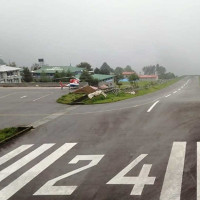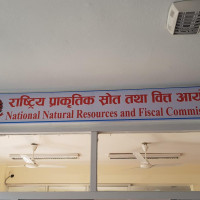- Saturday, 1 November 2025
Infrastructure Summit stresses development issues
By A Staff Reporter,Kathmandu, Sept. 14: The Nepal Infrastructure Summit 2024 concluded in the Capital on Friday with extensive deliberations on cross-cutting issues of development including energy and water resources, digital and information technology, transport infrastructure construction, urban development and waste management.
The two-day flagship summit jointly organised by the Confederation of Nepalese Industries (CNI) and Ministry of Physical Infrastructure and Transport (MoPIT) also dealt with the issues of provincial and local governments' development engagement and role of women.
Addressing the closing programme of the event, former Prime Minister and Chairman of CPN (Maoist Centre) Pushpa Kamal Dahal Prachanda said that the development of physical infrastructure was indispensable for the overall economic development of Nepal.
Stating that various laws related to business and investment were amended and formulated during the Investment Summit earlier this year to make the investment environment better in Nepal, Prachanda urged the investors from Nepal and abroad to make investment in infrastructure.
He termed the organisation of the summit as a creative and constructive move to contribute to the nation's development and economy and expressed his belief that the Government of Nepal will accept the suggestions made in the conference and implement the reforms accordingly.
The Summit was coorganised by the Investment Board of Nepal (IBN) and Youth Community for Nepalese Contractors (YCNC).
Rajesh Kumar Agrawal, President of CNI, informed that the suggestions regarding the importance of strategic investment to advance the sustainable development of Nepal would be provided to the government.
"Models of infrastructure development, identification of practical aspects that can be implemented in Nepal and the steps to be taken to ensure that our infrastructure projects are not only economically but also socially and
environmentally sustainable, were clearly suggested during the summit," he said.
Likewise, Secretary of the MoPIT, Keshab Kumar Sharma, said that the infrastructure conference received important suggestions from foreign and domestic experts on Nepal's infrastructure development. He expressed his commitment to accept the suggestions made in the conference and take the necessary steps for their implementation.
Earlier, discussing the energy sector development in Nepal, stakeholders said that the country had made a tremendous progress in clean energy, investment has gone up and use has increased.
While private sector played an instrumental role in this drive, they are still facing challenges at various fronts. The electricity bill is stuck at the parliament while there are multitudes of problems in cutting trees and land acquisition at the development site, said energy entrepreneurs, Kumar Pandey.
Experts suggested the government focus on reservoir-based hydroelectricity projects for the seamless supply of quality energy. They also said that it is still challenging to manage investment for the government target to develop projects generating 28,500 megawatts of electricity by 2035.
However, Ganesh Karki, President of Independent Energy Producers Association of Nepal (IPPAN), said that there were opportunities in Nepal's energy sector, from capital investment to production of necessary machinery.
"Generating 28,500 megawatts would require an investment of Rs. 4600 billion, and accordingly, there would be great opportunities for other businesses that are connected with it," he said.
Former joint-secretary, Keshab Dhoj Adhikari, informed that Nepal is at 115th position globally in terms of energy consumption. Total installed capacity of Nepal in electricity has reached 3,062 MW in which the private sector is contributing 2436 MW.
Likewise, the experts from the session on transport infrastructure said that key issues in Nepal’s transport involved inadequate road maintenance, with only 6 per cent of the budget allocated compared to the recommended 12-15 per cent as well as problems with road functionality and safety, leading to inefficiencies and high accident rates.
Incomplete projects and inefficient procurement processes also contribute to the difficulties.
The stakeholders suggested that the private sector should be engaged more effectively in infrastructure development and public transportation improvements. This includes better coordination, adoption of new technologies, and ensuring project viability. However, the government may need to provide guarantees or subsidies to attract private investment and ensure project success and safety.
Likewise, the provincial and local government stakeholders said that they face inadequate fiscal transfer, with provincial expenditures accounting for less than 10 per cent of the federal government’s total expenditure.
Capacity gaps, a lack of institutional structures, and the federal government’s encroachment on smaller local projects hamper their progress, they said. Coordination issues between federal and provincial governments, along with a centralist mindset, exacerbate these challenges.



-original-thumb.jpg)












